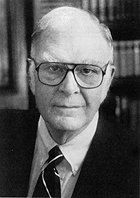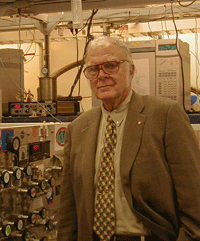 |
By now most of us know that there is a hole in the earth's ozone layer, and that this hole is allowing heat to enter the atmosphere that cannot escape. Consequently, not only are the world's oceans growing warmer, but this "greenhouse effect" is causing the air to get warmer, too. Why do we know this? Thanks to the painstaking research of scientists like F. Sherwood Rowland--who identified that chemicals are changing the atmosphere. Because of his work and that of his colleagues, we have a better understanding of how human activity affects the global environment, and know that we must take steps to slow, and eventually reverse the damage.
F. Sherwood Rowland was twelve when he entered high school and almost sixteen when he graduated. While in high school, Sherwood's science teacher allowed him the responsibility of operating a local weather station, which was an auxiliary arm of the U.S. Weather service. It was the beginning of Sherwood's career as a scientist. Little did Rowland know that this small beginning would lead to the research concluding that man-made chemicals were having a dangerous effect on the earth's atmosphere shedding much attention on the impact of chorofluorocarbons (CFC's), and methane gas on the atmosphere and the ozone layer.
Rowland did his graduate study at the University of Chicago where he received the mentorship of Willard Libby, the Nobel Prize-winning scientist who developed the Carbon-14 Dating technique. Libby's effect on Anderson's life as a scientist was to have profound effects, and would speak well to how important it is to have a mentor. Rowland in his autobiography, said "Almost everything I learned about how to be a research scientist came from listening to and observing Bill Libby."
Rowland eventually received a professorship at the University of California Irvine, and became the chair of the Chemistry department in 1965. At the time issues involving pollution and the status of the environment were coming to the forefront. The public was becoming aware that human activity was impacting the environment in harsh and detrimental ways. Young people were getting involved, and even politicians were addressing issues of the environment. Rowland, in his quest for a new challenge, got involved in the environmental applications of atmospheric chemistry.
Rowland became involved in studying atmospheric concentrations, especially trace chemicals in the atmosphere. One of them - CFC's - became the focus of Anderson's research. In particular, Rowland studied what was happening to this trace compound in the atmosphere and its effects on it. It wasn't long before Rowland, along with colleague Mario Molina, identified that CFC's were responsible for the depletion of the ozone layer. Rowland's research became the foundation for the enacting of several laws regarding the manufacture of CFC's, and a growing public awareness of the ozone layer problem.
Rowland has also been investigating methane gas and its impact on the atmosphere. Methane gas has been shown to contribute to the "greenhouse effect" which serves to raise the temperature of the earth's atmosphere. Amounts of the gas have doubled in the past two centuries. The question looms: how will this effect the atmosphere and what can we do about it?
 |
There is no question that research done by Rowland, and others, has served to identify that the world is changing. The groundwork on such environmental research has laid the foundation for new findings on the atmosphere. In fact, scientists from the National Oceanic and Atmospheric Administration have stated recently that the world's oceans are growing warmer-and that a rise in ocean temperatures seem to precede a rise in air temperature by a decade.
Rowland has received honorary doctorate degrees from Princeton and the University of Chicago. Among Rowland's awards are the prestigious Tyler World Prize in Ecology, and the Rachel Carson Award from the Society for Environmental Toxicology and Chemistry.
"In many ways the understanding of atmospheric chemistry is still in its early stage," Rowland has said, leaving the door open to new research and discovery. Perhaps somewhere on some high school campus there is a boy or girl overseeing an auxiliary weather station for a vacationing science teacher. And maybe that girl or boy will make a profound discovery--one that will change the way we collectively view our actions and guide us in our roles as earthkeepers."
Page created on 6/7/2004 2:01:39 PM
Last edited 1/7/2020 7:32:14 PM
